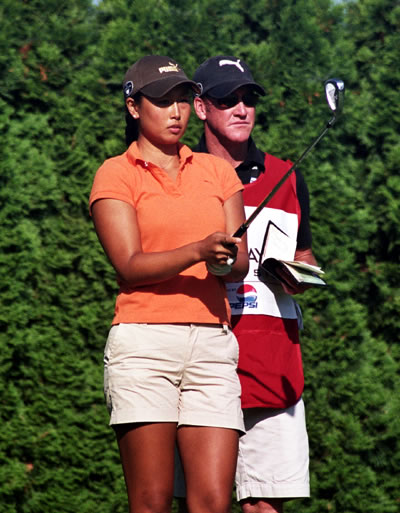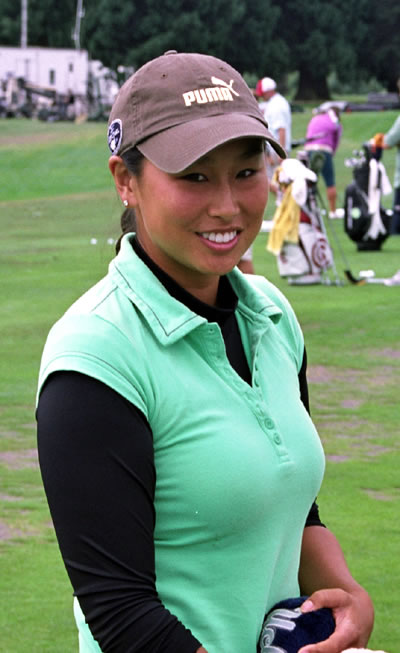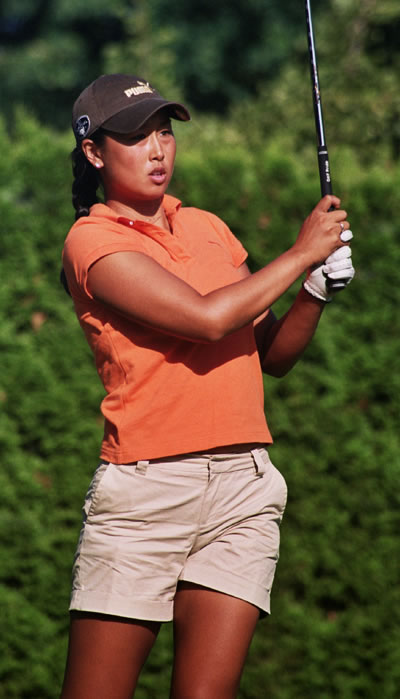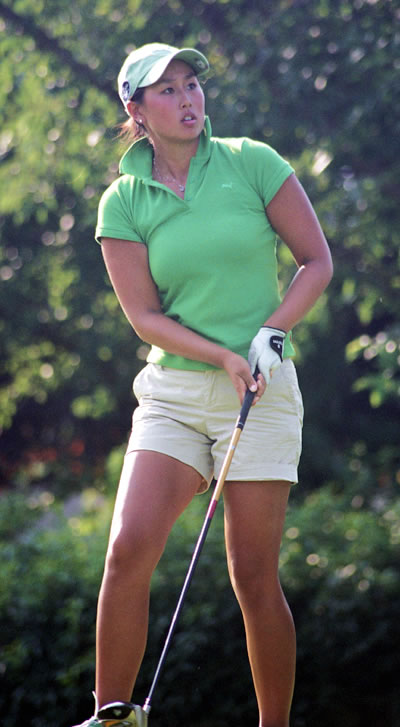 |
 |
 |
 |
 |
 |
Hana Kim Interview
 Strengths
and Weaknesses
Strengths
and Weaknesses
SS: What are your strengths, do you think?
HK: My ball striking has always been my strength since I was young.
And my iron play. But I've never been a great putter, but last year, and
this year, I've really struggled with my putting… enough where my
iron play couldn't really carry me through. But I really have a lot of
faith that I've figured out what's been going on, kind of up in my head…
and kind of reinstilled the belief of being a great putter. So I have
a lot of good feelings for the week, and I'm really looking forward to
the tournament. (Editor's note: her feelings were correct. She finished
25th, her best finish of the season to that date).
SS: Do you switch equipment a lot? Are you one of these people
that stays with (the same stuff)?
HK: I don't switch equipment a whole lot, especially my irons and
my wedges. My wedges I think I've had since college. My irons I just switched
a month ago, because my set from college… there were no grooves left.
And… I found a 3-wood that I love, so I don't plan on switching at
all. And the driver, I've probably been through, in the last two years,
two drivers, which, I don't know, may be a lot, may not be a lot, I don't
know. I switched putters a few times out of anger (laughs) and mistrust…
I have various conspiracy theories (laughs). But I don't know, I guess
it just depends on my mood.
SS: So as a non-exempt/conditional player, do you find it tough
because you can't really set your schedule… What do you do the rest
of the year when you're not playing tournaments? Are you playing mini-tours?
HK: Do you mean in the off season?
SS: No...
HK: In between events when I don't get in fields?
SS: Yeah, or even in the off season, but I mean… how many
(LPGA) events have you played this year, six or seven?
HK: I don't know. Probably like eight, I don't know... I feel like
every non-exempt player goes through a point in their schedule where they
have to decide what they're going to do. And I know there are girls that
are right around my number that decided it's not worth it, I'm going to
go down to the Futures Tour, try and get my card that way. For me, I didn't
feel that that was an option.
 SS:
Why not?
SS:
Why not?
HK: I played eight events when I first got out of college as kind
of a prep for…
SS: On the Futures Tour?
HK: Yeah… Right out of college I played eight events, and
it was a prep for me to go to Q-School. I just didn't feel like it was
something that I personally felt like I wanted to do (play the Futures
Tour regularly), for various reasons. I felt like, the reason that a lot
of players gave for going back down was, it was really discouraging to
try Monday qualifying (on the LPGA tour) and not make it, and have the
whole week off. But for me, I felt like, if I don't Monday qualify, I'm
going to be practicing anyway, and why wouldn't I just practice at the
country club that is the tour stop that week? Because, it's basically
primped for us, to be the best facility that it can be. So, I've got the
(inaudible) and the best balls… I'm going to practice here, and figure
out what's going on, and make myself more confident and better. And that
was the commitment that I made. So, I never dropped down and played mini-tour
events, and I was up here and playing these events. And I've got my friends
out here, they're real supportive, and I've got a good support system
out here, which is really important, I think. Last year, it was tough
trying to get a feel for everybody, and figure out what's going on, but
… You know, when I was Monday qualifying, if I didn't get in, it
was all right. I just practice all week, and made sure that I was making
good use of the time I had out here. It was just my personal strategy,
and whether it paid off or not, I guess we'll find out at the end of the
year.
SS: So, do you have sponsorships, or do you have relatives helping
you out? How do you manage to make it?
HK: You know, I've been really very fortunate. I have an endorsement
deal with Puma Golf, within their golf line; they just make really great
stuff for young people. Fashion forward, but not over the top.
SS: Your clothing is Puma?
HK: Yes, and the shoes, the bag. They're just a great company to
be associated with. They really take care of their athletes, and it's
just a great place where I can just call them. I don't have to be "Business
Hana", I can just call them up, "Hey! It's your golfer, what's
going on?" They're just easygoing, and they love the sport, and they
really take care of me. I'm really proud to be affiliated with them. I
also have an endorsement with the National Golf Club, and I wear their
logo on my hat and my shirt, and on my bag.
SS: What's that?
HK: It's basically an organization of country clubs and golf courses
around the country. If you buy a membership at a country club that's affiliated
with the National Golf Club, you can pay X number of dollars more and
up your membership to become a national member. Which means that you are
not only a member at your country club, but you are a member at every
club that's affiliated with National Golf. Which is great for anybody
who travels, especially someone like me, because I have all these practice
facilities… like, we're up here in Oregon, and I can go up to Pumpkin
Ridge at the end of the week, and decide I can play over there.
SS: That's a nice course!
HK: Yeah, it's really great! I've been very very fortunate, and
I'm really extremely proud to be associated with both the companies whose
logos I wear.
SS: That's great!
HK: (laughs) Yeah, it kinda worked out!
 SS:
Do you have a regular coach and a caddie, or do you get a caddie whenever
you come to a tournament? How does that work?
SS:
Do you have a regular coach and a caddie, or do you get a caddie whenever
you come to a tournament? How does that work?
HK: I have a regular caddie, and he's also my coach. He's the pro
at Mountain Gate Country Club in Los Angeles. His name is Patrick Boyd.
He's extremely knowledgeable, and he was on tour for a number of years,
and he's a good player. His advice has just been invaluable to me. Especially
last year, when I didn't know up from down. He's carried for a couple
of other girls out here and I think that they found him to be pretty knowledgeable
as well. Also another area that I've been really fortunate in, you know?
I just stumbled upon a lot of great people and companies and all that.
SS: Wow, that's awesome.
HK: Yeah!
SS: Your younger sister… Ina is her name?
HK: Yeah.
SS: She's graduated (from college) already?
HK: She graduated from Northwestern in '05.
SS: You were on the same (golf) team with her?
HK: Yeah, yeah, we played one year together before I transferred.
She decided to stay. She now works for a financial company.
SS: She's not interested in pro golf?
HK: No, she's just doing her own thing right now. Managing lots
of money. Actually, for a full year, I thought she was a bank teller!
I had no idea what her job was (laughs). But I guess she handles trusts
and lots of important financial stuff that I really have no understanding
of. She's got a good thing going (laughs).
SS: Have you ever played golf in Korea?
HK: Yes, when I was very young. I haven't been back to Korea in
eight, ten years. But the last time I was there, I was able to play.
SS: Are you second generation or third generation?
HK: My parents came here in 1976. My dad's parents came also at
that time. I guess I'd be a 1.5, I guess that's what they call it…
But yeah, I was able to play golf (there), and actually my sister went
back with my parents two years ago, and they all played… without
me (laughs). But yeah, golf in Korea is fabulous, and I was very fortunate
to be able to play, and I still have good memories of it.
SS: Have you ever been invited by the KLPGA or one of the Korean
tours to play in a tournament?
HK: I have not been invited. I don't know why.
SS: Well, when you win this week, they'll invite you over.
HK: Yeah (laughs)!
SS: Do you speak Korean?
HK: Yeah, yeah, I speak Korean, I can read and write it.
 Temperament
Temperament
SS: What kind of player would you describe yourself as on the course?
Are you a reserved player? Are you more fiery? Do you get upset?
HK: Um, I don't know… That's a good question. At my worst,
I guess you could say moody, and at my best I would say reserved. I think
that, when I have a problem, and I'm not playing my best, I do tend to
get a little moody, angry, unhappy and all that. But luckily my caddie
kind of keeps me in line, and tries to keep me calm. And when I am thinking
mentally better, I think that I'm more reserved and I try to just kind
of keep to myself, try to be a good playing partner, but try to stay focused
on what I need to do. And that's kind of where I like to be most of the
time: somebody who's pleasant to play with, but maybe if they have to
call me reserved, I'd be OK with that. You know what I mean?
SS: Absolutely. So, when you're starting to get moody, do you
actually think to yourself, I've gotta pull it back?
HK: Yes, absolutely. A lot of amateurs just think that… It's
interesting, a long time ago, when I was first trying to turn pro…
well, "a long time ago", two years ago…
SS: (laughs)
HK: I remember thinking pros are different than me, and that I
could not be a pro, because for me I had all these mental demons, (and)
for pros, the reason they're pros is that golf is easy and they don't
have all these mental demons. But actually, that is so far from the truth.
And I think that I have to really keep reminding myself of that lesson
I learned. And we fight the same demons that all the amateurs (do). You
could be a 25 handicap… but we're still fighting those demons in
our heads. I just really have to monitor my thinking all the time, as
does everybody out here. The best players out here are the ones who can
monitor their thinking the best. I'm always trying to get to the point
where I'm feeling like I was better today than I was yesterday. And if
I keep doing that, there's going to come a point where it's going to really
pay off, I think. So then, I just keep chugging along…. (laughs)